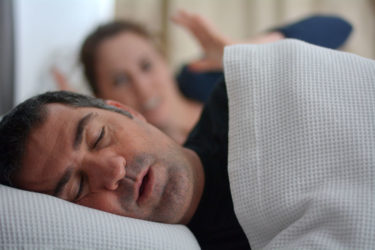Obesity hypoventilation syndrome (OHS) is a condition in obese people in which poor breathing leads to lower oxygen and higher carbon dioxide levels in the blood.
Causes, incidence, and risk factors
The exact cause of OHS is unknown. The condition is believed to result from both a defect in the brain’s control over breathing, and excessive weight (due to obesity) against the chest wall. This makes it hard for a person to take a deep breath. As a result, the blood has too much carbon dioxide and not enough oxygen. People with OHS are often tired due to sleep loss, poor sleep quality, and chronic low blood oxygen levels (hypoxia).
Most patients with the syndrome have a form of sleep apnea. Obesity is the main risk factor.
Symptoms
The main symptoms of OHS are due to lack of sleep and include:
- Daytime sleepiness
- Depression
- Headaches
Symptoms of low blood oxygen level (chronic hypoxia) can also occur, such as shortness of breath or feeling tired after very little effort.
Signs and tests
People with OHS are usually very overweight. A physical exam may reveal:
- Bluish color in the lips, fingers, toes, or skin (cyanosis)
- Signs of right-sided heart failure (cor pulmonale), such as swollen legs or feet, shortness of breath, or feeling tired after little effort
- Reddish complexion
Tests used to help diagnose and confirm OHS include:
- Arterial blood gas
- Chest x-ray to rule out other possible causes
- Lung (pulmonary) function
- Sleep study
Doctors can tell OHS from obstructive sleep apnea because patients with OHS have high carbon dioxide levels in the blood when awake.
Treatment
The treatment involves breathing assistance using special machines (mechanical ventilation). Options include:
- Noninvasive mechanical ventilation (BiPAP or other modes) through a mask that fits tightly over the nose or nose and mouth (mainly for sleep)
- Breathing help (tube) through an opening in the neck (tracheostomy)
- Oxygen
Other treatments are aimed at weight loss, which can reverse OHS.
Support Groups
Support groups can help patients with OHS, or their family members, adjust to the lifestyle changes needed for treatment to be successful. Also, support groups can offer information about new treatments.
Expectations (prognosis)
Untreated, it can lead to serious heart and blood vessel problems, severe disability, or death. Chronic sleeping problems may also increase the chance of having a motor vehicle accident.
Complications
Complications of OHS have to do with a lack of sleep, such as:
- Increased risk for accidents or mistakes at work
- Depression, agitation, irritability
- Sexual dysfunction
OHS can also include heart problems, such as:
- Hypertension
- Right-sided heart failure (cor pulmonale)
Calling your health care provider
Call your health care provider if you are very tired during the day, or have any other symptoms that suggest OHS.
Prevention
Maintain a healthy weight and avoid obesity.














